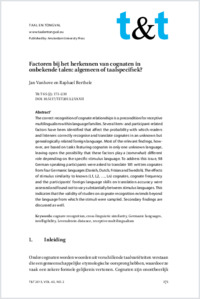Factoren bij het herkennen van cognaten in onbekende talen: algemeen of taalspecifiek?
BLE-BLL
- Vanhove, Jan University of Fribourg
- Berthele, Raphael University of Fribourg
-
2013
Published in:
- Taal en Tongval. - 2013, vol. 65, no. 2, p. 171-210
cognate recognition
cross-linguistic similarity
Germanic languages
intelligibility
Levenshtein distance
receptive multilingualism
English
The correct recognition of cognate relationships is a precondition for receptive multilingualism within language families. Several item- and participant-related factors have been identified that affect the probability with which readers and listeners correctly recognise and translate cognates in an unknown but genealogically related foreign language. Most of the relevant findings, however, are based on tasks featuring cognates in only one unknown language, leaving open the possibility that these factors play a (somewhat) different role depending on the specific stimulus language. To address this issue, 98 German-speaking participants were asked to translate 181 written cognates from four Germanic languages (Danish, Dutch, Frisian and Swedish). The effects of stimulus similarity to known (L1, L2, ..., Ln) cognates, cognate frequency and the participants’ foreign language skills on translation accuracy were assessed and found not to vary substantially between stimulus languages. This indicates that the validity of studies on cognate recognition extends beyond the language from which the stimuli were sampled. Secondary findings are discussed as well.
- Faculty
- Faculté des lettres et des sciences humaines
- Department
- Département de plurilinguisme et didactique des langues étrangères
- Language
-
- Dutch
- Classification
- Language, linguistics
- License
-
License undefined
- Identifiers
-
- RERO DOC 308928
- DOI 10.5117/TET2013.2.VANH
- Persistent URL
- https://folia.unifr.ch/unifr/documents/306869
Statistics
Document views: 150
File downloads:
- Fichier postprint: 150
